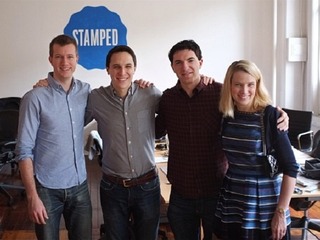
Yahoo buys personalized recommendation service Jybe
Founded by a team of ex-Yahoos, Jybe team goes back home

Yahoo made it clear that it wants to be competitive in mobile, and has been making a series of moves, including updating its Flickr app and purchasing location discovery app Alike, to push the company in that direction.
A big part of success on mobile, though, requires precise targeting and personalization; basically, knowing what ads to send to which users at which time. Now Yahoo has taken a step toward making that a reality, hiring back some of its former employees with experience in that field.
Yahoo has acquired personalized recommendation service Jybe, it was announced Wednesday. Terms of the deal were not disclosed.
This seems to have been an acqui-hire, as Menlo Park, California-based Jybe will be shutting down as part of the acquisition. The service was launched two years ago by a group of five ex-Yahoo employees, all of whom will now be coming back to their former place of employment. They be joining Yahoo’s platform organization, focused on targeting and personalization.
"This will be a 'coming home' for the team -- all five are former Yahoos," Jay Rossiter, SVP of Cloud Platform Group at Yahoo, wrote in a blogpost. "Arnab Bhattacharjee was the VP of Yahoo! Search Technology (YST), one of the most well-respected engineering and platforms groups in the company. He returns together with former key members of the YST and Hadoop teams -- Tim Converse, Christian Kunz, Sameer Paranjpye, and Karthik Krishnamurthy."
For their part, the team at Jybe seems happy to be coming home.
"The Jybe team first set off two years ago to bring mobile users smart, personalized recomendations on food and entertainment. This has been a fun and furious journey for our tiny startup, as we applied our various technology backgrounds to recommendation and mobile app design. It's now time to move ahead to join a larger company, and Yahoo! is the perfect match," Jybe wrote in a message on its homepage.
"We can't wait to apply what we've learned about recommendation, personalization and the mobile experience to the hundreds of millions of people who come to Yahoo! every day. We look forward to (re)joining the world-class talent already working at Yahoo! and are excited to hit the ground running."
Though the Jybe service is closing, the company will be allowing its users to download and keep all of their data.
With both a location service, and now a team with knowledge in personalized recommendations, Yahoo should be able to be able to see where a person is, what is around them, and send out coupons or advertisments for local restaurants and stores.
Other recent Yahoo acquisitions
In October, Yahoo acquired Stamped, the Justin Bieber-backed mobile app that lets users “stamp” and share their favorite restaurants, movies, books, music, and more.
Then, in December, Yahoo acqui-hired the team from OnTheAir, a video chat service that can be used for casual hangouts or to organize largish webinars, due to users’ ability to moderate speakers and converse with participants via a split screen. Audience members can “call in,” or they can chat with one another. Yahoo claims that it has no plans to use the technology though.
Most recently, in February, Yahoo announced the purchase of location discovery app Alike to make good on its promise to focus on mobile.
If a user entered the name of a place they liked into the Alike app, it would look through it database of 20 Million places, and hundreds of terabytes of meta data, to find a new place that it felt that user would also enjoy.
It was also reported on Tuesday that Yahoo was in talks to buy up to a 75% stake in user-generated video site Dailymotion, though Yahoo did not respond to our request for a statement on that news.
Related Companies, Investors, and Entrepreneurs
Alike, Inc.
Startup/Business
Joined Vator on
alike enables you to use the places you like to find new places you’ll love.
Keywords suck. First, they are too simplistic. When you search for a coffee shop a keyword based engine won’t know if you wanted the best java in town or a nearby place to crank out some emails. Second, they are too vague. Google returns 12,938 results for coffee shops in San Francisco. And finally, they are generic – with rankings based on popularity/SEO rather than relevance. None of the current options let you organize results to find what you really want.
The alike engine takes search beyond the keyword to solve this problem. Using alike anyone can simply enter the name of something they enjoy, alike will identify this ‘entity’, and then alike will provide the user with similar ‘entities’ that they will love.
The alike search engine has developed a semantic understanding of many different entities (places, products, people) and their attributes (locations, cost, reviews, preferences).
Related News


Yahoo gets its mobile on with Flickr app update

Report: Yahoo looking to buy a stake in Dailymotion

Yahoo purchases Alike to make good on mobile promise

